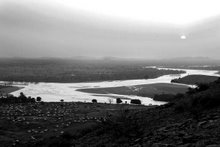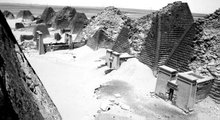Last night, after going mad from boredom and loneliness in my compound, I went for a walk in a drizzling rain through empty streets and happened on a busy teashop.
The room was just a small straw hut covered in a blue UNICEF tarpaulin and under it huddled twenty young men hovered over sheesha pipes. At least ten of them smoked deeply and breathed out a thick cloud of sweetened smoke as their neighbors conversed. Everything was somber except for the glowing red coals that hovered in front of their dark faces, and the bright hearth that sat in the corner holding a small fire.
There was too much smoke for me to enter, and nowhere to sit, so I joined the others outside under the rain in the almost pitch-black muddy street. The young locals with whom I sat and exchanged pipes with were an employee of a humanitarian organization, a young soldier in Sudanese army fatigues, an older Chadian boy who had left his studies across the border just short of a high school degree and arrived here to join his comrades and “fight for the revolution,” as well as the entrepreneurial owner of the shack along with a few stragglers. It seemed to me a strange but normal group, a typical cross-section of employment opportunities here in Darfur.
We sat and smoked and exchanged pleasantries through my limited Arabic, taking turns holding a small metal lid over the coals to protect them from being extinguished by the cold falling rain. It was nice to be out from behind my barbed wire compound, where my colleagues sat and watched satellite TV and drank smuggled Chadian Whiskey (“Johnny Walter”) alone and insulated from the celebrating town around them. People in town seem to be happy on Ramadan nights, when they sit with friends and family and - I imagine - feel the agreeable sensation of food in their stomach after a long day of fasting.
The Chadian rebel left to go watch the Barcelona football game. I was soaked when I stood up to leave, and I walked back to my gate to hear my security guard reprimand me for being out past curfew. But it was a nice excursion. There were no gunshots heard in the distance, and I later slept peacefully.
Wednesday, September 19, 2007
Wednesday, September 12, 2007
400 - 500 Killed ?
Rebels from the Justice and Equality Movement (JEM) and the Sudan Liberation Army - Unity faction say they shot down two helicopters, destroyed 70 military vehicles, and captured many soldiers while repelling an attack on the town of Haskanita by Sudanese Government Forces.
Rebel leaders also say that among those captured is a high-ranking Sudanese Army General.
That much has been published in an article by the Sudanese Tribune, a Southern newspaper based out of Juba. What was not published, and what I have been told by sources here, is that the rebels claim to have killed up to 500 Sudanese soldiers. They have even asked international aid organizations for help in burying them!
If this is the truth - and my sources have confidence that it is - then why is the international media not covering this story?
The main reason is that most people here are afraid of getting expelled. Jan Pronk, former head of United Nations Mission in Sudan, was thrown out of the country in late 2006 after blogging his thoughts on the effect of Sudanese military defeats on the morale of the armed forces.
Unfortunately, not only aid workers practice self-censorship. Journalists have been kicked out of the country or even jailed for publishing facts that offend the government. This is the sad debate that many of us in advocacy or journalism churn around in our heads - to submit watered-down reports and stay, or write the reality and not sleep at night for fear of waking up unemployed and kicked out of the country.
Rebel leaders also say that among those captured is a high-ranking Sudanese Army General.
That much has been published in an article by the Sudanese Tribune, a Southern newspaper based out of Juba. What was not published, and what I have been told by sources here, is that the rebels claim to have killed up to 500 Sudanese soldiers. They have even asked international aid organizations for help in burying them!
If this is the truth - and my sources have confidence that it is - then why is the international media not covering this story?
The main reason is that most people here are afraid of getting expelled. Jan Pronk, former head of United Nations Mission in Sudan, was thrown out of the country in late 2006 after blogging his thoughts on the effect of Sudanese military defeats on the morale of the armed forces.
Unfortunately, not only aid workers practice self-censorship. Journalists have been kicked out of the country or even jailed for publishing facts that offend the government. This is the sad debate that many of us in advocacy or journalism churn around in our heads - to submit watered-down reports and stay, or write the reality and not sleep at night for fear of waking up unemployed and kicked out of the country.
Tuesday, September 11, 2007
Malnutrition
On Jul 31 Reuters published an article on the malnutrition rate of Al Geneina, the capital of West Darfur. It discussed a recently published survey performed by an international NGO stating that global acute malnutrition rates in the town had increased to 2 percentage points above emergency level. According to the Reuters article, the head of the NGO assured that “urgent action” was needed to prevent a worsening of the situation.
This week, in a related AP article, a local UN official said that “malnutrition is on the rise in Darfur,” and another official – this time from New York - declared that malnutrition rates were “well over” 17 percent in many areas of Darfur, and that we were experiencing a general decline in the humanitarian situation.
But just five days before, a Los Angeles Times article said,
“Since 2005, key indicators, including mortality and malnutrition rates, have been improving steadily. Today those rates are not only below thresholds commonly used internationally to define an ‘emergency,’ but in some cases, they are better than before the conflict, or better than those observed in other parts of Sudan and Africa.
‘There is very little malnutrition and very little disease,’ said Mike McDonagh, the north Sudan manager for the U.N. Office for the Coordination of Humanitarian Affairs. ‘We very quickly got it turned around.’
Malnutrition rates in Darfur have been reduced by almost half since 2004 to 12.9%, according to U.N. figures. The ‘emergency’ threshold is 15%.”
So what is actually going on?
This week, in a related AP article, a local UN official said that “malnutrition is on the rise in Darfur,” and another official – this time from New York - declared that malnutrition rates were “well over” 17 percent in many areas of Darfur, and that we were experiencing a general decline in the humanitarian situation.
But just five days before, a Los Angeles Times article said,
“Since 2005, key indicators, including mortality and malnutrition rates, have been improving steadily. Today those rates are not only below thresholds commonly used internationally to define an ‘emergency,’ but in some cases, they are better than before the conflict, or better than those observed in other parts of Sudan and Africa.
‘There is very little malnutrition and very little disease,’ said Mike McDonagh, the north Sudan manager for the U.N. Office for the Coordination of Humanitarian Affairs. ‘We very quickly got it turned around.’
Malnutrition rates in Darfur have been reduced by almost half since 2004 to 12.9%, according to U.N. figures. The ‘emergency’ threshold is 15%.”
So what is actually going on?
Subscribe to:
Comments (Atom)


